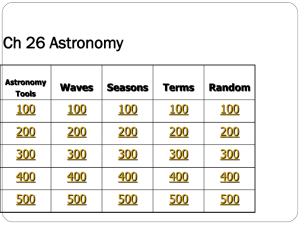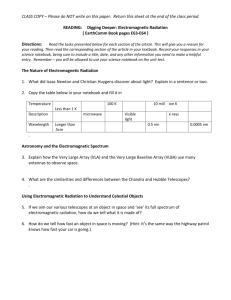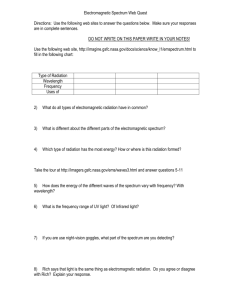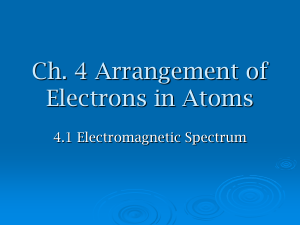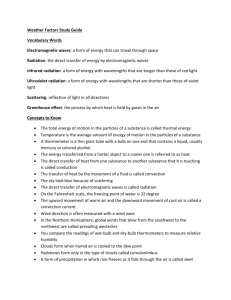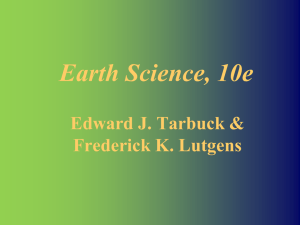File
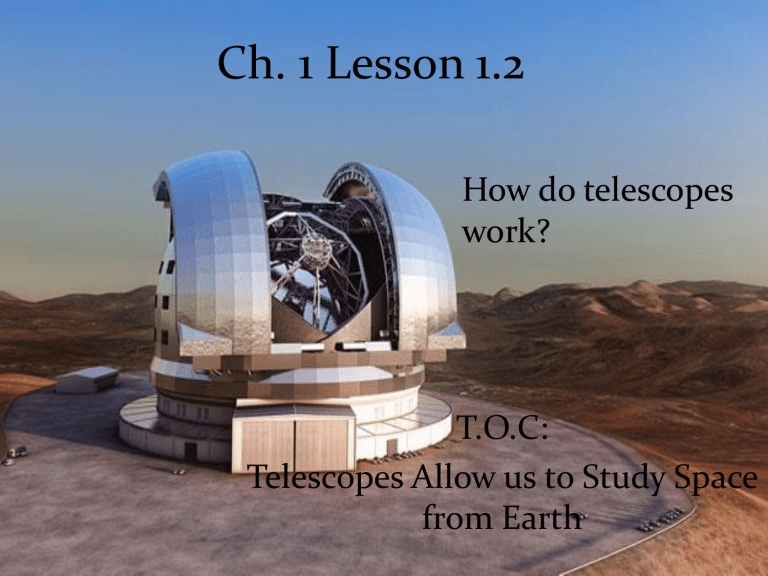
Ch. 1 Lesson 1.2
How do telescopes work?
T.O.C:
Telescopes Allow us to Study Space from Earth
Telescopes Capture Light
• Light is a form of radiation that carries info from space
• Electromagnetic radiation (EMR)w.w- energy that travels across distances as certain types of waves.
– Travels in all directions thru space
– Almost everything we know about the universe came from the study of this radiation!
– Can tell size, distance, & mvmt of object by its radiation as well as what it’s made of & how it’s changed!
• So, how does light allow us to “see” an object then?
– Light reflects from object & travels to your eyes. Your eyes gather light from the object you’re looking at!
The Electromagnetic Spectrum w.w
• All forms of electromagnetic radiation
– In order from longest radiation wave to shortest: radio waves, microwaves, infrared, visible (white), ultraviolet, x-rays, gamma rays
About White/Visible Light
– prism/flashlight demo
• A tiny part of the electromagnetic spectrum
• We can see it, but we see it in colors…
• Spectrum(w.w) these colors make up visible light, in order of wavelength- long to short- Red, orange, yellow, green, blue, indigo, violet. (rainbow)
• Wavelength(w.w)- distance between one wave peak to the next wave peak.
Telescopes (w.w)
• Galileo Galilei- 1609/1610- created 1 st telescope. Supported Copernicus belief of Sun as center of universe. Discovered moon craters
& Jupiter’s 4 large moons.
• Device that gathers EMR
– Some gather visible light (mine) to provide clear images than what is seen w/ your eyes
– Others show radiation that our eyes can’t see
• Astronomers use telescopes to gather info about space
– Different colors/shades reveal patterns of radiation
• Most gather info w/ a glass lense or reflecting surface (like a mirror) & data is gathered electronically.
2 Types of Visible-Light Telescopes
1. Reflecting- has curved mirror that reflects light
– Can be built to gather infrared or ultraviolet radiation
– Image focuses on mirror & reflects to eyepiece
– Ex: mine
2. Refracting- has curved piece of glass at one end of a long tube
– Gathers light & focuses it to form image at other end of tube
– Eyepiece magnifies images
The most powerful telescopes are built on mountain tops in rural areas. Why is this?
Less light from city, less interference w/ our atmosphere b/c less air (air mvmt in atmosphere causes the stars to “twinkle”)
Radio Telescopes
• Shows where radio waves are being emitted by space objects
• Has curved metal surface called a dish (think satellite) that gathers radio waves & focuses them on an antennae which is connected to computers that receive the incoming data
• So big b/c radio waves are so long!
• A group of these pointed at one object can show more detail than the largest satellite dish.
• Not affected by clouds, bad weather, etc. b/c radio waves pass thru Earth’s atmosphere freely.
Telescopes in Space
• Hubble Space Telescope (see pic)- reflecting telescope.
– Placed in Earth’s orbit in 1990 & is operated from Earth
– Sends images/data to Earth electronically
– Very clear images of space b/c it’s IN space (no atmosphere)
– Collects visible, ultraviolet, & infrared radiation images
– Just a part of a group of telescopes that orbit Earth & allow astronomers to gain info from electromagnetic spectrum. http://www.youtube.com/watch?v=ah6KrqABzmk http://www.youtube.com/watch?v=olk5fjbygX8
Spectroscope Lab- Page 21- create table in Notebook
– Need: spectroscopes, flashlight (2), fluorescent lamp (2), blacklight, sunlight
– Students in groups. DO: “Observe & Analyze” #1 & “Conclude”
#1, 2, 3
1.2 Review Q’s 24 pts
1. What is electromagnetic radiation (EMR)? (2 pts)
2. What form of EMR is particularly important for humans? Why? (2 pts)
3. List the forms of electromagnetic radiation in order from longest to shortest wavelength. (7 pts)
4. List the visible light spectrum in order from longest to shortest wavelength. (7 pts)
5. Explain how radio telescopes work. (3 pts)
6. Explain how/why Galileo Galilei’s invention of the telescope was important for science. (3 pts)
